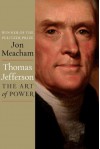Currently reading
400 Years Of Freethought
Thomas Jefferson: The Art of Power
Fairy Tales from the Brothers Grimm: A New English Version
Doubt: A History: The Great Doubters and Their Legacy of Innovation from Socrates and Jesus to Thomas Jefferson and Emily Dickinson
The Kingdom of Matthias: A Story of Sex and Salvation in 19th-Century America
Late Victorian Holocausts: El Niño Famines and the Making of the Third World
 This is a scary book. The genocidal imperialists in this story are the British (and briefly, the Americans in the Philippines), but dial the clock ahead a hundred years and it’s all us. Seriously. Davis begins his story with a description of ex-president Ulysses Grant’s “family vacation” around the world. As the hero of the Civil War sailed from feast to banquet, a copy of Innocent’s Abroad in his lap (I wonder if this is documented, or if it was just an anecdote that was too ironic to pass up?), the world was in the grip of a climatic event of global proportions. The late-1870s famine was the first of a series of three that together killed more than 50 million people. Davis argues that these deaths, however, were not due to natural disaster, but to political choices made before, during, and after the droughts and crop failures occurred. One of the main points Davis makes in Late Victorian Holocausts is that “We are not dealing…with ‘lands of famine’ becalmed in the stagnant backwaters of world history, but with the fate of tropical humanity at the precise moment (1870-1914) when its labor and products were being…forcibly incorporated into [the British Empire’s] economic and political structures.” (9) This is an important point, because even today well-meaning writers publish sympathetic articles that perpetuate the myth that “Of course, famine and pestilence are part of India’s ancient story.” Actually, says Davis, “India and China…did not enter modern history as the helpless ‘lands of famine’ so universally enshrined in the Western imagination.” (287) An 1878 study in the Journal of the Statistical Society “contrasted thirty-one serious famines in 120 years of British rule against only seventeen recorded famines in the entire previous two millennia.” Similarly, China had a ridiculously long history of successful state and local famine relief. And the two nations were economically competitive. “The looms of India and China,” Davis says “were defeated not so much by market competition as they were forcibly dismantled by war, invasion, opium, and a Lancashire-imposed system of one-way tariffs.” Although it has been forgotten by history, “The use of force to configure a ‘liberal’ world economy…is what Pax Britannica was really about.” (295) And it really does seem to be the fault of history (that is, historians). Because a lot of this was known at the time, at least among radicals and socialists who opposed the British government’s imperial policies. Davis refers several times to Henry Hyndman’s speeches and articles, and to radical journalist William Digby’s chronicle of the 1876 Madras famine. “If Kipling’s verse exalted colonizing optimism and scientific racism, Conrad’s troubling stories warned that Europe itself was being barbarized by its complicity in secret tropical holocausts.” (140) Even “Cosmopolitan pointedly published photographs of famine victims from the Central Provinces next to an illustration of a great monument erected to Queen Victoria.” (157) It was clear that at least some contemporaries saw “mass starvation as avoidable political tragedy, not ‘natural’ disaster.” The elimination of these perspectives from history supports Davis’ claim that “the great famines are the missing pages — the absent defining moments, if you prefer — in virtually every overview of the Victorian era.” (8) Throughout his story of these horrific famines (in which parents regularly sold and sometimes ate their children), Davis calls attention to the fact that food surpluses existed close at hand, and that previous systems of social organization had been much more effective at mobilizing these surpluses to avert starvation. The difference under British rule was the “theology” of capitalism, which idealized free markets even while it encouraged speculation and hoarding. “Millions die,” Davis concludes, “was ultimately a policy choice.” (11)“Although crop failures and water shortages were of epic proportion…there were almost always grain surpluses elsewhere in the nation or empire that could have potentially rescued drought victims.” Sound familiar? But it wasn’t just ignorance or lack of concern for the colonized people, Davis suggests. “Each global drought,” he says, “was the green light for an imperialist landrush.” (12) Although Late Victorian Holocausts includes a detailed scientific account of our emerging understanding of ENSO cycles, the real power of the book is in Davis’ identification of the link between “social vulnerability” and “climate variability.” (288) “There is compelling evidence,” Davis quotes Prasannan Parthasarathi, “that South Indian labourers had higher earnings than their British counterparts in the eighteenth century and lived lives of greater financial security…enjoyed better diets…possessed superior rights of contract and exercised more economic power.” (292) The changes over time that eliminated these eastern advantages need to be examined. And not just for the British—Americans benefited. “Opium shipments from India [to China] reached a peak of 87,000 chests in 1879, the biggest drug transaction in world history.” (300) The deliberate addiction of millions of Chinese to opiates by the British not only impoverished the Chinese economy (and coincidentally, even darling of the Neoliberals, Hans Rosling, admits a causal connection between social insecurity and high birth rates that might help explain the Chinese population boom), but “enabled Britain to sustain her deficits with the United States and Europe on which those countries depended for export stimulus and, in the case of the United States, capital inflow.” (Quoting A.J.H. Latham 1978, 359)
This is a scary book. The genocidal imperialists in this story are the British (and briefly, the Americans in the Philippines), but dial the clock ahead a hundred years and it’s all us. Seriously. Davis begins his story with a description of ex-president Ulysses Grant’s “family vacation” around the world. As the hero of the Civil War sailed from feast to banquet, a copy of Innocent’s Abroad in his lap (I wonder if this is documented, or if it was just an anecdote that was too ironic to pass up?), the world was in the grip of a climatic event of global proportions. The late-1870s famine was the first of a series of three that together killed more than 50 million people. Davis argues that these deaths, however, were not due to natural disaster, but to political choices made before, during, and after the droughts and crop failures occurred. One of the main points Davis makes in Late Victorian Holocausts is that “We are not dealing…with ‘lands of famine’ becalmed in the stagnant backwaters of world history, but with the fate of tropical humanity at the precise moment (1870-1914) when its labor and products were being…forcibly incorporated into [the British Empire’s] economic and political structures.” (9) This is an important point, because even today well-meaning writers publish sympathetic articles that perpetuate the myth that “Of course, famine and pestilence are part of India’s ancient story.” Actually, says Davis, “India and China…did not enter modern history as the helpless ‘lands of famine’ so universally enshrined in the Western imagination.” (287) An 1878 study in the Journal of the Statistical Society “contrasted thirty-one serious famines in 120 years of British rule against only seventeen recorded famines in the entire previous two millennia.” Similarly, China had a ridiculously long history of successful state and local famine relief. And the two nations were economically competitive. “The looms of India and China,” Davis says “were defeated not so much by market competition as they were forcibly dismantled by war, invasion, opium, and a Lancashire-imposed system of one-way tariffs.” Although it has been forgotten by history, “The use of force to configure a ‘liberal’ world economy…is what Pax Britannica was really about.” (295) And it really does seem to be the fault of history (that is, historians). Because a lot of this was known at the time, at least among radicals and socialists who opposed the British government’s imperial policies. Davis refers several times to Henry Hyndman’s speeches and articles, and to radical journalist William Digby’s chronicle of the 1876 Madras famine. “If Kipling’s verse exalted colonizing optimism and scientific racism, Conrad’s troubling stories warned that Europe itself was being barbarized by its complicity in secret tropical holocausts.” (140) Even “Cosmopolitan pointedly published photographs of famine victims from the Central Provinces next to an illustration of a great monument erected to Queen Victoria.” (157) It was clear that at least some contemporaries saw “mass starvation as avoidable political tragedy, not ‘natural’ disaster.” The elimination of these perspectives from history supports Davis’ claim that “the great famines are the missing pages — the absent defining moments, if you prefer — in virtually every overview of the Victorian era.” (8) Throughout his story of these horrific famines (in which parents regularly sold and sometimes ate their children), Davis calls attention to the fact that food surpluses existed close at hand, and that previous systems of social organization had been much more effective at mobilizing these surpluses to avert starvation. The difference under British rule was the “theology” of capitalism, which idealized free markets even while it encouraged speculation and hoarding. “Millions die,” Davis concludes, “was ultimately a policy choice.” (11)“Although crop failures and water shortages were of epic proportion…there were almost always grain surpluses elsewhere in the nation or empire that could have potentially rescued drought victims.” Sound familiar? But it wasn’t just ignorance or lack of concern for the colonized people, Davis suggests. “Each global drought,” he says, “was the green light for an imperialist landrush.” (12) Although Late Victorian Holocausts includes a detailed scientific account of our emerging understanding of ENSO cycles, the real power of the book is in Davis’ identification of the link between “social vulnerability” and “climate variability.” (288) “There is compelling evidence,” Davis quotes Prasannan Parthasarathi, “that South Indian labourers had higher earnings than their British counterparts in the eighteenth century and lived lives of greater financial security…enjoyed better diets…possessed superior rights of contract and exercised more economic power.” (292) The changes over time that eliminated these eastern advantages need to be examined. And not just for the British—Americans benefited. “Opium shipments from India [to China] reached a peak of 87,000 chests in 1879, the biggest drug transaction in world history.” (300) The deliberate addiction of millions of Chinese to opiates by the British not only impoverished the Chinese economy (and coincidentally, even darling of the Neoliberals, Hans Rosling, admits a causal connection between social insecurity and high birth rates that might help explain the Chinese population boom), but “enabled Britain to sustain her deficits with the United States and Europe on which those countries depended for export stimulus and, in the case of the United States, capital inflow.” (Quoting A.J.H. Latham 1978, 359)








